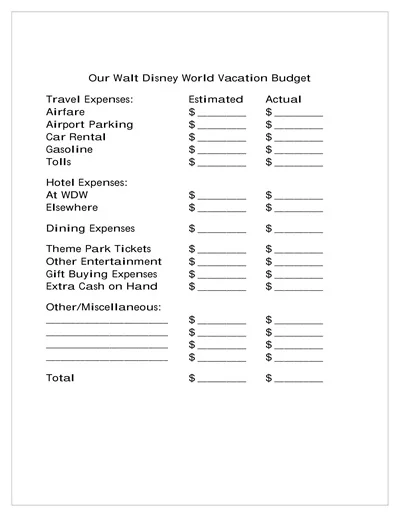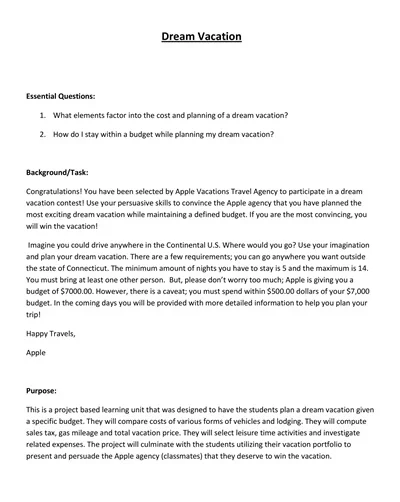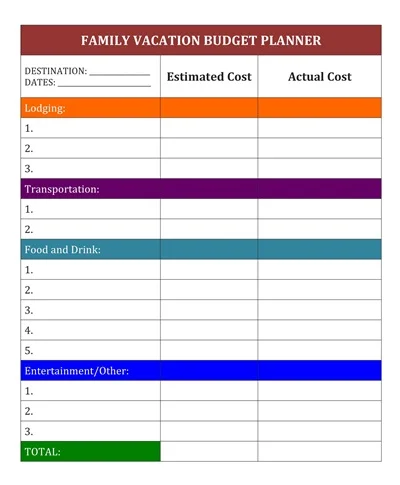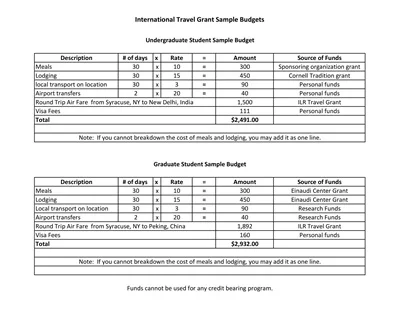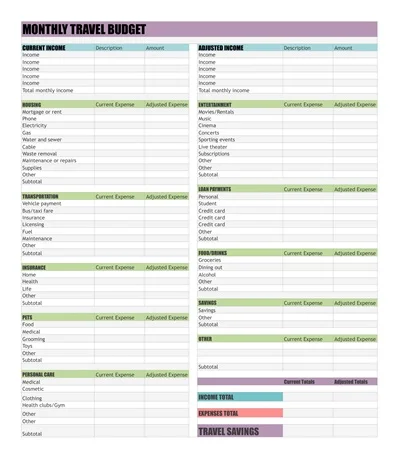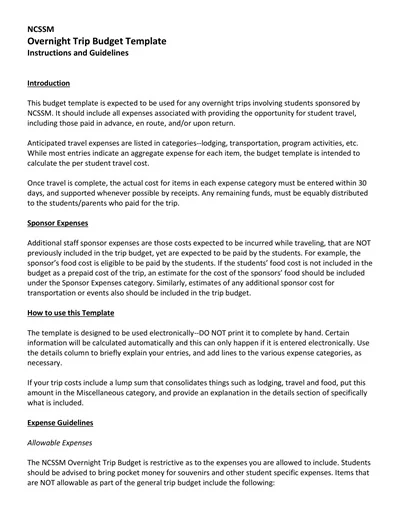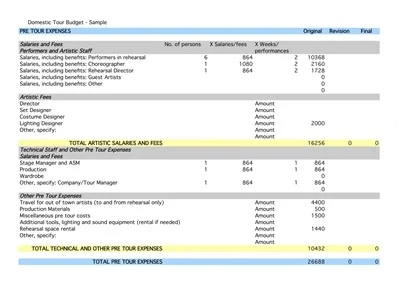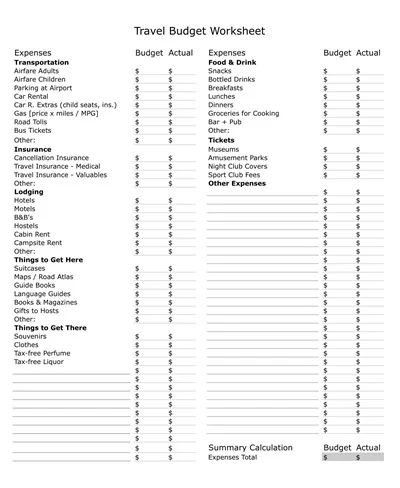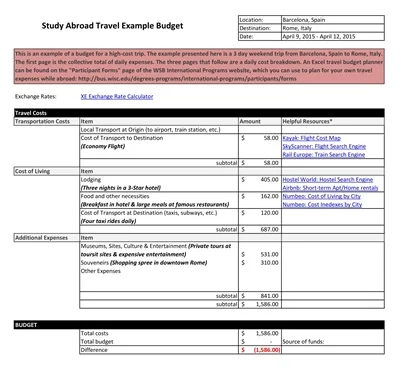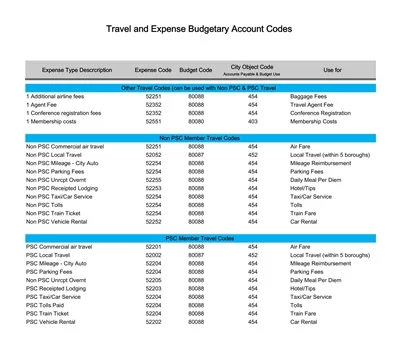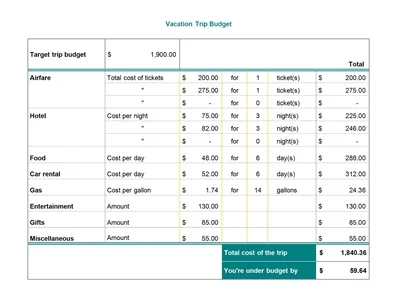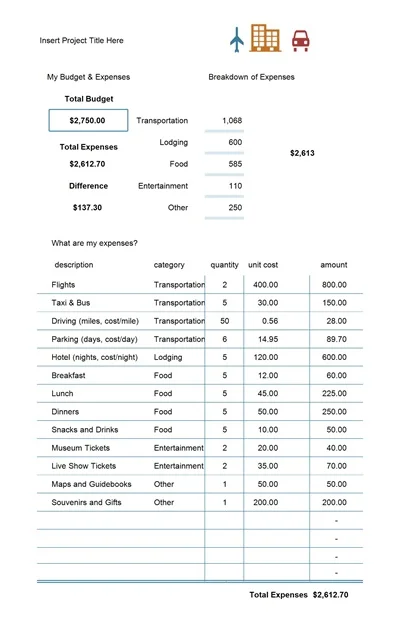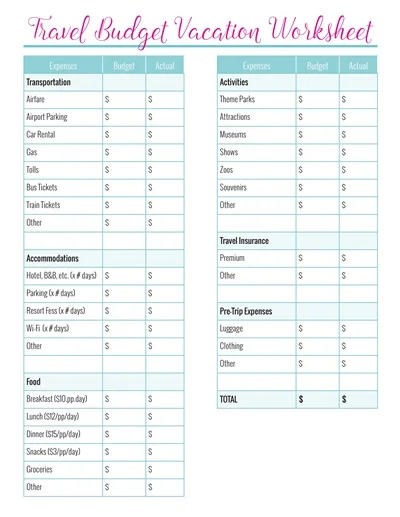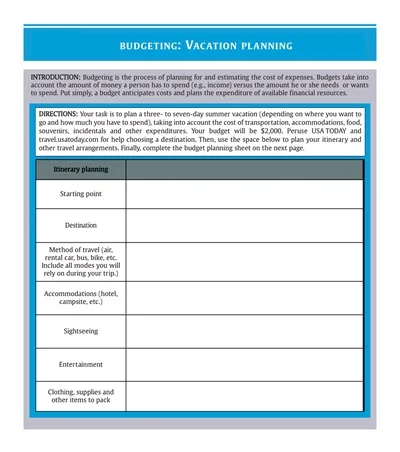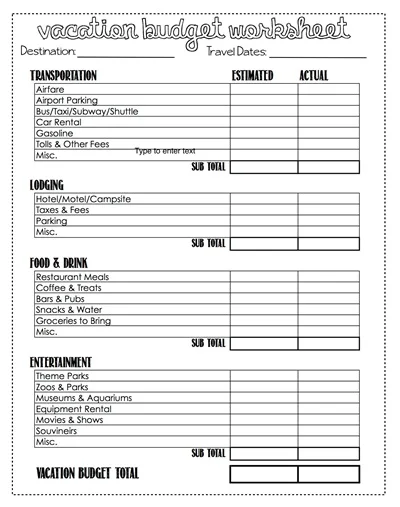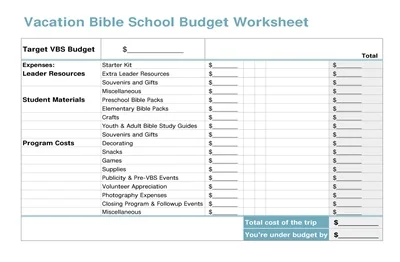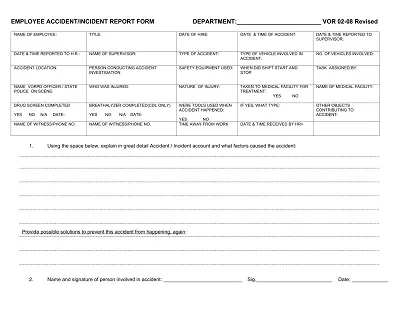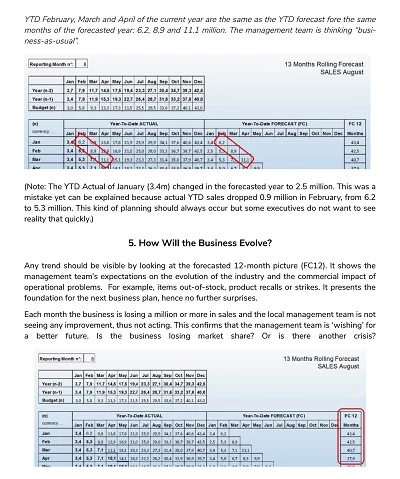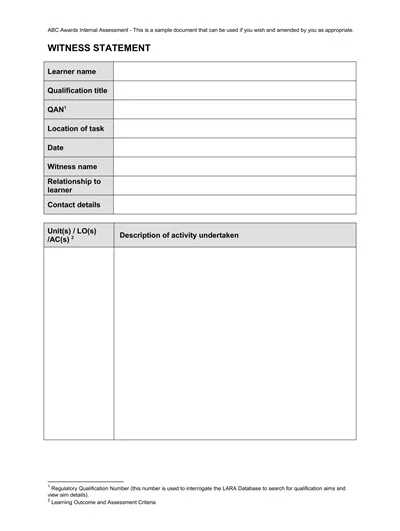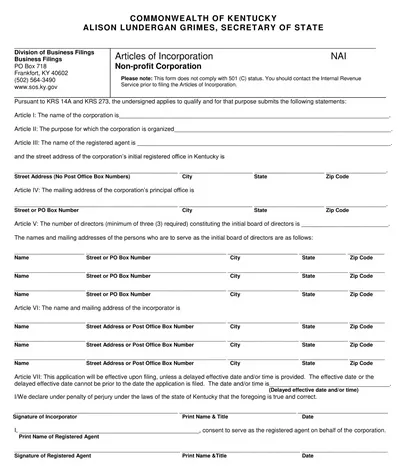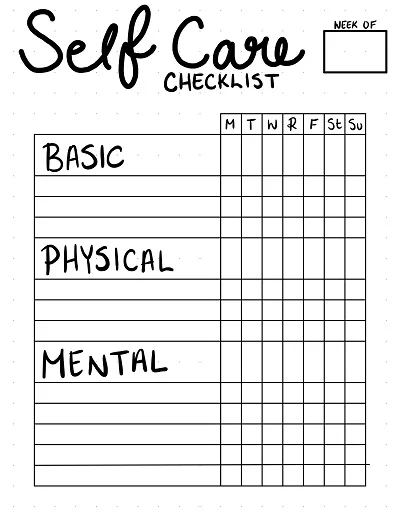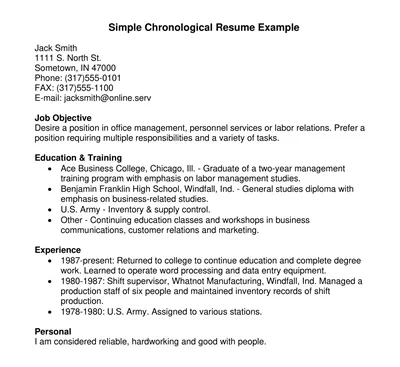A Travel Budget Template is a budget plan that contains a general layout that will help the traveller keep track of the amount of money spent on the journey. These areas are usually grouped into subcategories such as transport, lodging, meals, entertainment, and contingency money.
This way, it helps travellers effectively distribute their money because the cost of food, accommodation, and other basic amenities is well catered for without having to break the bank. Travellers will find budgeting for their travel useful when they employ this travel budget template; it will be easier for them to experience their travel without having to worry about expenses.
Download Free Simple Travel Budget Templates
What is a Travel Budget?
Travel budgeting is the technique used in determining organizational expenses that may occur during a particular trip or journey, such as transport, meals, lodging, and other incidental expenses believed to be expected. It is a guide to tourists’ spending demands and enjoyable activities in that they don’t have to worry so much about expenditures.
When people differentiate and freeze massive amounts of money in checking accounts for peculiar sections of the travel agenda, they get an insight into the ways and means of practical spending and how to control it effectively while at the same time preserving their capacity for enjoyment of travel.
Elements of a Travel Budget
Next, we discuss some of the most important areas to include when developing a realistic travel budget.
The main elements to consider are:
- Transportation: This involves all travel expenses up to your destination and within that region, such as flying, railway, buses, self-driving cars, and local transport means.
- Accommodation: Depending on the kind of trip you are going on, accommodation expenses may include hotel bills, hostel fees and prices, renting a holiday house, and renting a caravan, house, or tent.
- Food and Drink: Predict the amount of money spent on foods, non-alcoholic drinks, and total food and beverages consumed per day. This may not be consistent when eating out or cooking. Rather, it will greatly depend on the type of food you plan to prepare.
- Activities and Entry Fees: Do not forget to factor in the expenses of entry fees for the attractions or the tours, museums, parks or events that you intend to go to.
- Shopping and Souvenirs: Set a specific amount of money aside for vain clothing, gifts, and souvenirs that you can buy when you get tired of travelling.
- Emergency Fund: Savings is another important thing in financial management because you must have some money to cover any unpredictable expenses.
Just note that managing your travel budget smartly is a sure way of making the journey fun and less stressful.
Importance of Travel Budget
It has nonetheless been appreciated that constructing a travel budget is important for several reasons. First, it helps to avoid overspending during a trip and to have a contingency plan in case anything goes wrong, the trip takes longer than expected, or the trip costs more than expected.
An organized financial plan also enables tourists to make the right choices about their preferences for accommodation, travel, and other potential spending actions, knowing fully well the next move they have to make without getting stuck in debt during the trip.
Furthermore, having a budget compels tourists to look for reasonable costs, which in turn exposes them to better, unique, and positive experiences since they are now driven away from scams and other overpriced products.
Common Budgeting Mistakes to Avoid
Budgeting is a crucial tool for successfully implementing the principles of apportionment of available funds. In fact, the process of budgeting is not easy for many individuals and tends to involve mistakes. I will summarize the key points of this section by stating that the reader should avoid certain errors when creating the budget plan.
1. Not Setting Clear Financial Goals
Not setting concrete goals leads to aimless spending and saving habits needed for effective financial management. This suggests that it may be hard to assess the extent of success, especially given that goal setting provides direction, especially when it comes to budgeting.
2. Underestimating Expenses
One of the biggest blunders that most people make is failing to allocate every expense that a business will incur, whether it is fixed or variable. This can lead to cases where there is excess spending and a lack of adequate amounts set aside to cater for emergencies and other things like savings.
3. Overlooking the Importance of an Emergency Fund
Failing to put up an emergency fund or even having one but not being a regular contributor to it leaves one in a relatively appalling position that is a calamity for unplanned incidents. It is recommended to have an emergency fund that should be enough money to cover 3-6 months of expenditures.
4. Failing to Adjust the Budget
Many people consider a budget to be an immovable plan, but that is not the case at all. This must be updated periodically in order to accommodate new needs every year in terms of income, expense, and financial objectives. The same may result in overspending or failure to reach maximum utilization of possible savings if one fails to update her or his budget.
5. Ignoring Small Expenses
Little exposures have a nasty habit of compounding that can quickly put the venter off balance. They should be planned for so as to control them and to be able to have an overall understanding of your expenditure.
Benefits of Using a Travel Budget
Following some guidelines and tips on budgeting could have several advantages, helping you avoid unnecessary tension and enjoy travelling.
Here are a few to consider:
- Financial Control: A travel budget is important as it enables you to have control over finances and have an idea of how the amount of money you can spend on your tour. This mitigates the probability for one to spend more than their amount allows and subsequently, leads to someone facing financial pressures.
- Better Planning: Budgeting a certain amount for certain sections of your trip, like room, food, and other activities, forces you to consider the options and make your decision at one point. This can result in a more streamlined and efficient experience for the travellers and the airline.
- More Travel Opportunities: Although rational schedules must be created to minimize transport costs, it is equally wise to note that by sparing cash on one trip, one may have extra coins that one can use to travel in the future. Another key advantage related to efficient commercial resource use is the ability to extend one’s travel budget.
- Prioritize Spending: A travel budget is useful in enabling one to consider areas of priority. It is also possible to decide beforehand that you wish to blow your cash on some special event or on a visit to a candlelight dinner. Then, one can easily save money on anything else but have the money to spend on the things that one wants.
- Unexpected Expenses: A good travel budget will have room for unexpected expenses that cannot be predicted. This can make you comfortable in the knowledge that you are protected from the inevitable mishaps that affect everyone without leaving you out of pocket.
Tips for Saving Money While Traveling
People consider travelling one of the pleasures of life, but unfortunately, it is a costly affair. However, with some necessary aspects of your life prioritized and proper choices made throughout life, you can easily cut down your costs and get the most out of life in one way or another.
Here are some effective tips for saving money while on the go:
Book in Advance
Whether it be for airline tickets, the hotel you plan to stay in, or the activities you plan to do while in a particular destination, it is highly recommended that you pre-book these as they can greatly help you save a significant amount of money. Travelling agents and popular tourist attractants such as airlines and hotels have discounted charges that are considerably cheaper than those within the stipulated travelling period.
Travel During Off-Peak Seasons
Travelling and visiting during the off-peak seasons is cheaper since the cost of accommodation, and fares are likely to be lower than during peak seasons. Few people are around, which can make the vacation more enjoyable. This commonly refers to periods other than the holidays and summer off-seasons for school-going children.
Use Public Transportation
The use of public transport is not only a better option due to its impact on the environment but also on the pocket as compared to investing in a taxi or renting a car. In most cities, there are travel cards where tourists can travel through the city without limitations within a stipulated period of time, and it is economical.
Choose Hotels with Kitchenette Availability
It is something like food. If you can find hotels or other rental places that have kitchen services, you will save a lot of cash on the foods you will be taking. Eating out, even simple meals, will cost you a lot of money, and, therefore, it can be easily minimized by preparing your meals at your temporary home away from expensive restaurants.
Seek Out Free Activities
As you know, many places still boast a plethora of free things, including city walks, museum visits, and natural sights. A little research beforehand can reveal some great value-for-money attractions in many countries.
Promoting the Use Of discount Cards and Coupons
Visit local tourist offices, which may provide you with coupons that will save you a considerable sum of money on cat attractions, restaurants, and sometimes even transportation. Coupons and promo codes can also be available for an activity or a restaurant.
How to Make a Travel Budget Template
Having a template of how to budget your travel is crucial to enable you to be financially free to enjoy your trip especially in those extraordinary spending aspects that were not anticipated.
Follow these steps to make a comprehensive and user-friendly template:
- Estimate Total Trip Cost: In this step, forecast the overall cost of your travel and any associated expenses you might expect.
- Airfare or transportation costs
- Accommodation expenses
- Amount spent strictly on foods and beverages consumed in a day
- While transportation (rental car or public transport, taxis, etc. )
- Activities and excursion fees
- Grocery (7), Clothing (6), Other (5), Entertainment (3), Transportation (1), Miscellaneous (shopping, souvenirs, emergency funds)
- Break Down Expenses by Category: Germany also stresses the importance of grouping your budget into easily identifiable categories as well.
- Transportation
- Lodging
- Meals
- Activities
- Miscellaneous
- Allocate Funds: Determine the proportion of the budget total that you will assign to each of the categories by subjecting the categories to a relative significance to the envisaged travel experience.
- Track Spending: You need to add a block to your template that enables you to record expenditures throughout the trip conveniently. This may assist you in maintaining costs within control and only correcting the strategy if needed.
- Include a Buffer: These estimates should always be accompanied by a contingency or allowance of about 10% to 20% of the total estimated amount.
- Review and Adjust: When planning for the next holiday, consider reviewing the expenses incurred and identifying possible areas for cost-cutting in the future.

